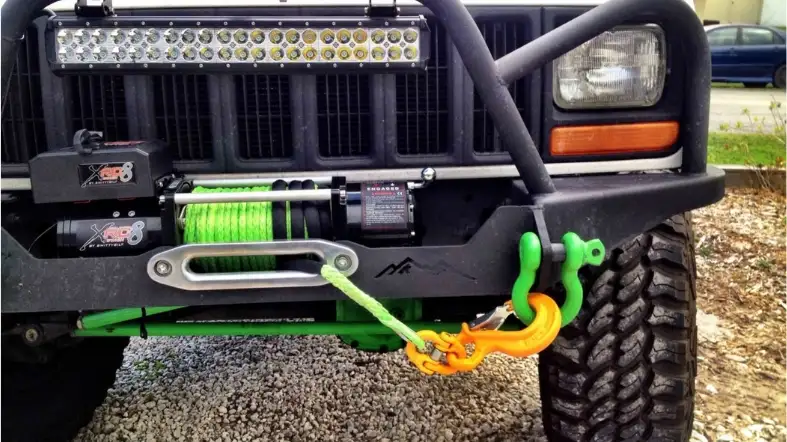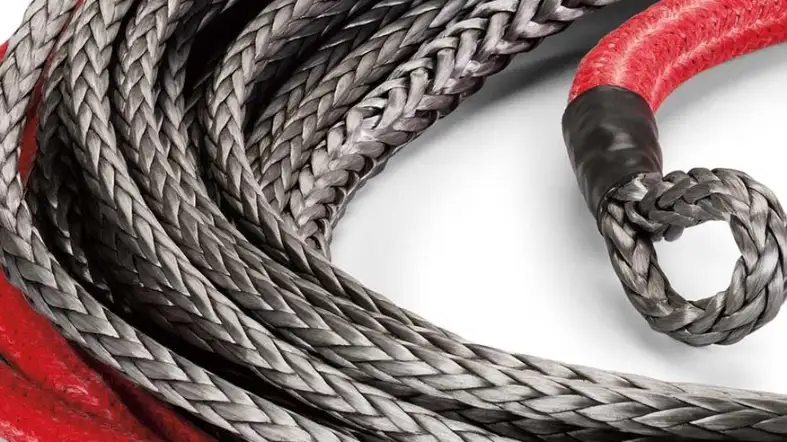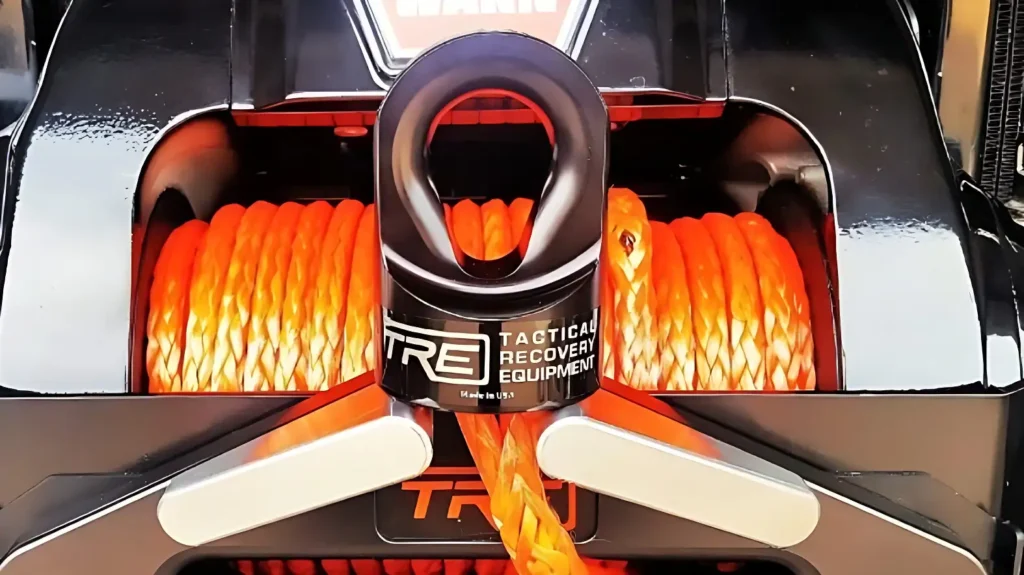Are you looking for a winch rope but unsure which one to choose between synthetic and steel?
Synthetic winch ropes are lightweight, easy to handle, and provide a higher breaking strength than their steel counterparts.
They are also safer to use, do not rust or corrode, and require less maintenance.
Today we will discover all the benefits of synthetic winch ropes and why they are the better choice.
Is Synthetic Winch Rope Better?
Yes, synthetic winch rope is better than traditional steel cable as it’s lighter, easier to handle, and safer in case of breakage.

It also doesn’t rust, kink or fray, making it more durable and reliable.
Comparison Between Synthetic Winch Rope and Steel Winch Rope:
Here are an overall comparison Between Synthetic Winch Rope and Steel Winch Rope:
Material:
Synthetic winch rope is typically made of high-strength synthetic fibers such as Dyneema, Spectra, or Amsteel Blue, while steel winch rope is made of steel wire.
Synthetic fibers are generally lighter and more flexible than steel wire, which can make them easier to handle and reduce the weight on the winch.
Steel wire can vary in composition and strength, but it is typically made of carbon or stainless steel.
Weight:
Synthetic winch rope is significantly lighter than steel winch rope, which can make it easier to handle and reduce the weight on the winch.
This can be especially important for vehicles that need to reduce weight for better performance or fuel efficiency.
Steel winch rope is much heavier than synthetic winch rope, which can make it more difficult to handle and transport.
Strength:
Synthetic winch rope can have a higher breaking strength than steel winch rope of the same diameter, but steel winch rope is typically stronger than synthetic winch rope of the same diameter.
Synthetic fibers can have a high strength-to-weight ratio, which makes them ideal for certain applications.
Steel wire is stronger than synthetic fibers and can handle heavy loads, but it can also be more susceptible to fatigue and wear over time.
Stretch:

Synthetic winch rope has very low stretch or “creep,” which can help prevent shock loading and make it easier to control the load.
Steel winch rope can stretch under heavy loads, which can cause shock loading and make it harder to control the load.
Synthetic fibers are also less likely to kink or tangle, which can reduce the risk of damage to the rope.
Durability:
Synthetic winch rope can be more durable than steel winch rope in some situations, as it can resist damage from UV light, water, and chemicals.
Steel winch rope can be more durable than synthetic winch rope in other situations, such as when subjected to sharp edges or extreme heat.
Synthetic fibers are also less likely to rust or corrode, which can extend the lifespan of the rope.
Corrosion Resistance:
Synthetic winch rope is generally more resistant to corrosion than steel winch rope, as it does not rust or corrode like steel wire.
This can be especially important for winches used in wet or humid conditions or exposed to saltwater.
Synthetic fibers can also be more resistant to chemicals, which can extend the lifespan of the rope.
Abrasion Resistance:

Synthetic winch rope can have good abrasion resistance, but it can be damaged by sharp edges or rough surfaces.
Steel winch rope can be more resistant to abrasion than synthetic winch rope, but it can be damaged by rust and corrosion over time.
Synthetic fibers are also less likely to snag or fray, which can reduce the risk of damage to the rope.
Safety:
Synthetic winch rope can be safer than steel winch rope, as it is less likely to snap under heavy
loads and can reduce the risk of injury if it does snap.
Synthetic fibers are also less likely to recoil or whip when under tension, which can reduce the risk of injury to nearby people or objects.
Steel winch rope can be more dangerous if it snaps, as it can recoil with great force and cause serious injury or damage.
However, steel winch rope can also be easier to see and handle, which can reduce the risk of accidents caused by user error.
Maintenance:
Synthetic winch rope requires less maintenance than steel winch rope, as it does not require lubrication and is less prone to rust or corrosion.
However, synthetic fibers can be damaged by UV light, chemicals, and abrasion, so it is still important to inspect and replace synthetic winch rope as needed.
Steel winch rope requires more maintenance, as it needs to be lubricated to prevent rust and corrosion and should be inspected regularly for signs of wear and damage.
Cost:
Synthetic winch rope is generally more expensive than steel winch rope, but the cost difference can vary depending on the specific type and brand of rope.
Synthetic winch rope can be more cost-effective in the long run, as it can last longer and require less maintenance than steel winch rope.
However, the initial cost of synthetic winch rope may be prohibitive for some users.
Availability:
Synthetic winch rope may be less widely available than steel winch rope, especially in some geographic regions or for certain types of winches.
However, synthetic winch rope is becoming increasingly popular and widely available as more users discover its advantages.
Aesthetics:
Synthetic winch rope can be more aesthetically pleasing than steel winch rope, as it is available in a wider range of colors and patterns.
This can be important for users who want to customize the appearance of their vehicle or winch.
Our Verdict
Both synthetic winch rope and steel winch rope have advantages and disadvantages depending on the specific situation and use case.
Synthetic winch rope is generally lighter, safer, and requires less maintenance, but can be more expensive and may have limited availability in some regions.
Steel winch rope is generally stronger and more abrasion-resistant but can be heavier, more dangerous, and require more maintenance.
So from the above comparison and discussion we got synthetic winch rope that is much better than steel winch rope.
Frequently Asked Questions
Is Synthetic Winch Rope Stronger Than Steel Cable?
It can be. Synthetic winch rope can have a higher breaking strength than steel cable of the same diameter.
Does Synthetic Winch Rope Stretch?
Yes, synthetic winch rope can stretch slightly under load, but not as much as steel cable.
Is Synthetic Winch Rope Safer Than Steel Cable?
Synthetic winch rope is generally considered safer than steel cable because it is lighter and less likely to snap, causing injury or damage.
Does Synthetic Winch Rope Require Maintenance?
Yes, synthetic winch rope should be inspected regularly for signs of wear and damage.
It should also be cleaned and lubricated as needed.
Is Synthetic Winch Rope More Expensive Than Steel Cable?
Yes, synthetic winch rope is typically more expensive than steel cable, but it can be a worthwhile investment due to its safety and performance benefits.
Can Synthetic Winch Rope Be Used With Any Winch?
Synthetic winch rope can be used with most winches, but it is important to check the manufacturer’s recommendations for the specific winch model.
How Long Does Synthetic Winch Rope Last?
The lifespan of synthetic winch rope depends on usage, exposure to the elements, and maintenance. With proper care, it can last for many years.
Conclusion
When it comes to choosing between synthetic and steel winch ropes, the former is undoubtedly a better option.
Synthetic winch ropes are lightweight, easy to handle, and extremely durable.
They offer a higher breaking strength than steel ropes, are safer to use, and do not rust or corrode over time.
Moreover, synthetic winch ropes are less likely to kink or birdcage, which means they will last longer and require less maintenance.
Although synthetic winch ropes can be more expensive than steel ropes, their long-term benefits far outweigh the initial investment.
So, if you are in the market for a winch rope, choose synthetic and enjoy the peace of mind that comes with using a superior product.
